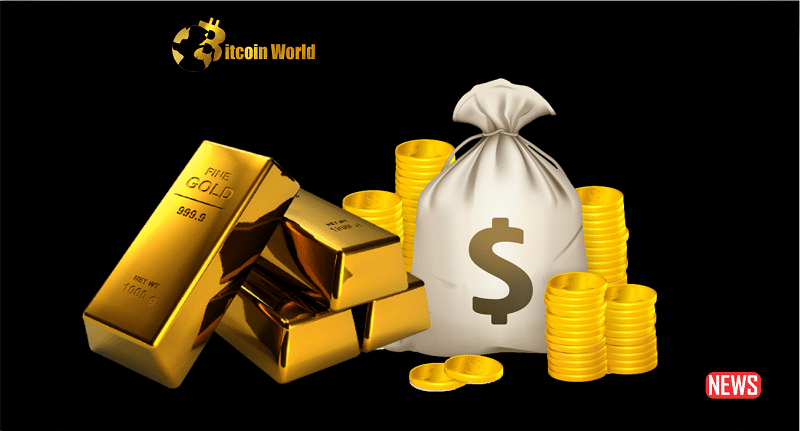Is the reign of the US dollar as the undisputed king of global finance starting to show cracks? Whispers of a ‘de-dollarization’ trend are growing louder, fueled by nations like Russia and the BRICS alliance (Brazil, Russia, India, China, and South Africa) actively reducing their dollar holdings and stocking up on gold. But is this a real threat to the dollar’s dominance, or just geopolitical posturing? Let’s dive into the fascinating shift happening in the world’s financial landscape.
Why the Dollar Doubt? The “Toxic” Label and Growing Concerns
Recent statements from Russian officials have been particularly blunt. A senior Russian administration member highlighted a noticeable move by some countries to decrease their dollar reserves while simultaneously increasing their gold reserves. Adding fuel to the fire, a report from the Russian state news agency TASS even labeled the US dollar as “toxic.” This might sound like strong rhetoric, but what’s driving this sentiment?
- Sanctions and Geopolitical Tensions: The use of the dollar as a tool for sanctions has undoubtedly made some nations wary of its potential for weaponization. Russia, facing significant sanctions, is a prime example.
- Concerns about Dollar Hegemony: The dominance of the dollar in world trade means that fluctuations in its value can have a significant impact on other economies. This “hegemony,” as Deputy Minister Pankin describes it, can lead to increased volatility.
- The Allure of Gold: Gold has historically been seen as a safe haven asset, a store of value that holds its worth even during economic uncertainty. For nations looking for alternatives to the dollar, gold presents a tangible and historically reliable option.
Hoarding Gold: A Quiet Revolution?
Pankin specifically pointed to 2022 as a year when certain nations actively “hoarded” gold at the expense of the dollar. While the specifics remain somewhat opaque, this suggests a deliberate strategy by some to diversify away from the greenback. But is this just a fringe movement, or could it become a mainstream trend?
Even though the dollar has shown strength recently, those advocating for de-dollarization argue that its dominance is ultimately fragile. As Pankin succinctly put it, “The US dollar is growing big and strong, yet it’s still dangerous for business operations.” This highlights the perceived risk associated with relying too heavily on a single currency, especially one influenced by the policies of a single nation.
De-Dollarization: Is it Really Happening?
While a complete and immediate abandonment of the dollar seems unlikely, the trend of de-dollarization appears to be gaining momentum. Russian Foreign Minister Sergey Lavrov went as far as to call it “unstoppable” and predicted it would accelerate. He pointed to increased trade flows among members of the Commonwealth of Independent States (former Soviet republics) as evidence, even as they navigated pressure from the US.
The BRICS nations are also reportedly playing a significant role in this shift. Their collective economic weight and stated desire for a more multipolar world order suggest a genuine interest in reducing reliance on the dollar. Treasury Secretary Janet Yellen even acknowledged the collaboration between Iran, China, and Russia to weaken the dollar’s dominance in oil pricing.
The Potential Impacts: What Does This Mean for the World?
If de-dollarization continues, what are the potential consequences?
- Increased Volatility: As Pankin noted, the dollar’s hegemony can create volatility. Conversely, a move away from the dollar could also introduce new forms of volatility as different currencies and trading systems gain prominence.
- Shifting Geopolitical Power: The dollar’s status as the world’s reserve currency has long been intertwined with US global influence. A decline in its dominance could lead to a shift in geopolitical power dynamics.
- New Trade Dynamics: Increased use of alternative currencies or payment systems could reshape global trade routes and relationships.
- Opportunities for Other Currencies: As the dollar’s share potentially shrinks, other currencies, or even a basket of currencies, might gain traction in international trade and reserves.
Challenges and Considerations
De-dollarization is not without its challenges:
- Establishing Credible Alternatives: Replacing the dollar requires building trust and infrastructure for alternative currencies or systems. This is a complex and long-term undertaking.
- Liquidity and Stability: The dollar’s deep and liquid markets provide a level of stability that other currencies may struggle to replicate.
- Political Hurdles: Overcoming the established infrastructure and political influence of the dollar will be a significant challenge.
Actionable Insights: What Can We Learn?
While the future is uncertain, the growing conversation around de-dollarization highlights the importance of:
- Diversification: For both nations and businesses, diversifying currency holdings can mitigate risks associated with the fluctuations of any single currency.
- Monitoring Global Trends: Staying informed about shifts in global financial flows and geopolitical dynamics is crucial for understanding potential impacts.
- Exploring Alternative Payment Systems: Businesses engaged in international trade should explore and potentially adopt alternative payment systems to reduce reliance on the dollar.
The Road Ahead: A Gradual Shift or a Rapid Revolution?
Whether the move away from the dollar will be a slow and gradual process or a more rapid shift remains to be seen. However, the signs suggest that the global financial landscape is evolving. The increasing interest in gold, coupled with open discussions about the dollar’s “toxicity” and the desire for alternative trading mechanisms, points towards a potential reshaping of the world’s financial order. Keep a close watch – the great gold shift is underway, and its implications could be profound.
Disclaimer: The information provided is not trading advice, Bitcoinworld.co.in holds no liability for any investments made based on the information provided on this page. We strongly recommend independent research and/or consultation with a qualified professional before making any investment decisions.


